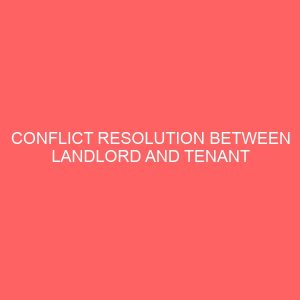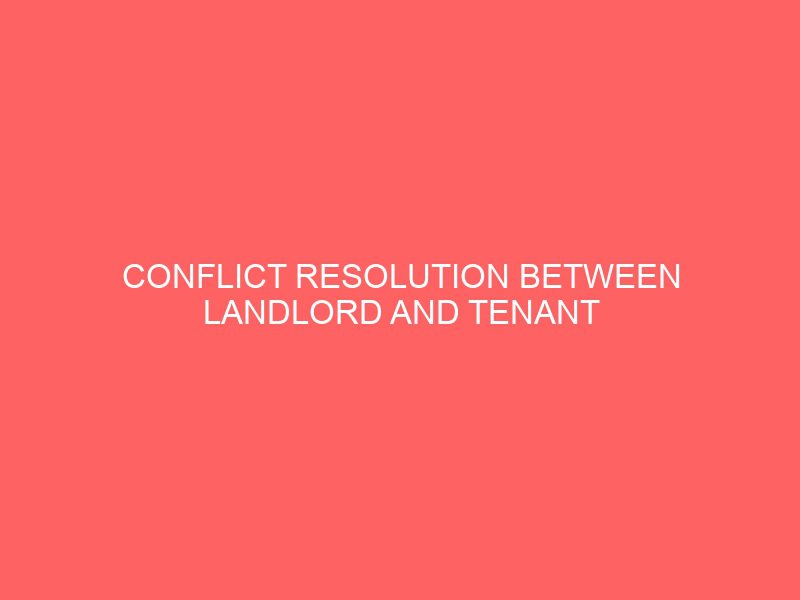Description
CHAPTER ONE
INTRODUCTION
1.1 Background to the Study
This research is on Conflict Resolution between landlord and tenant relationship in property management: case study North Bank. Landlords, tenants, and Estate Surveyors and Valuers may be regarded as stakeholders in a leasehold system and as a result of dealings amongst them, conflicts sometimes occur. The management contract formalizes the relationship between the property owner and the manager, while the lease sets up the rights and obligations of the landlord (owner/manager) and tenant. Usually, the relationships between the stakeholders are formalized such that specific rights and responsibilities of parties are spelt out. In respect of this, Kyle (2005) opined that the laws regulating leases demonstrate to the landlord and tenant the character of their relationship and as such must be clearly understood by the property managers, especially those covenants that directly affect the jurisdictions in which they operate.
In the opinion of Thorncroft (1976), the legal arrangements that provide frameworks for the landlord – tenant relationships are important and expected to be established properly, although they cannot substitute for dynamic working relationships that have the potential of bringing real prosperity and well-being to both parties. The success of estate management through lease control for that reason depends firstly on the terms of the lease; and secondly, on the way they are implemented. In consonance with
Thorncroft (1976), Morgan (2005) stated that although lawyers are responsible for legal and technical details of transactions involving the parties to a lease, property managers are expected to be familiar with the basic provisions of the leases. Making an allowance for conflicts, which cannot be entirely avoided and disagreement, which constitute the bulk challenge of managing income- generating properties by the Estate Surveyors and Valuers.
The property manager usually has the responsibility for leasing real estate in accordance to the terms of management contract, but his duties does not stop at that as he cannot avoid inconsistencies in the relationship between the landlord and tenant, which are a common occurrence in the renting process. However, such differences could be avoided if parties become aware of the rights and responsibilities ensued to them under the lease. This coupled with being open and having clear understanding of each other’s objectives for the long and short terms can remove uncertainty, build confidence and trust, and in the main prevent conflict (Aina, 1998).
Alluding further to this, Maxwell (2003) stated that developing and maintaining good working relationships between property owner and tenant is one of the responsibilities and priorities of a property manager, this being crucial to successful achievement of the aspirations and objectives of all parties. Consequently, understanding the relationship between the property owner and tenant is germane to successful management of real estate without which the stakeholders may not derive maximum benefits from their investments.
With this at the background, a study that attempts to examine and identify the issues and relationship that exists between landlords and tenants in the management of residential properties, with a view to attaining peaceable enjoyment of the return on the investment in real estate by the stakeholders is relevant and will afford the opportunity to determine the challenges and find ways of resolving them. Towards this end, selected purpose-built residential estates in North Bank, the capital city of Makurdi State in Nigeria was used as case study.
1.2 Statement of Research Problem
Shelter is ranked second in the hierarchy of human needs, being the most important after food in order of importance for survival; Nigeria, the most populous country in Africa and the eighth most populous country in the world, is facing serious housing challenge. (United Nations Department of Economic and Social Affairs Population Division, 2009); and RIRFHUD (2009), regarded this as evident in the available statistics indicating that 87% of the total population of households in the country live in rented apartments. While specifically in Makurdi, 60% of residents are tenants leaving housing demand to an estimated figure of approximately 2.17 million annually. Most of the existing accommodation units are provided by private investors, and tenants have to pay rent as high as 50-70% of their monthly incomes. Furthermore, in the opinion of Landlords and Tenants Rights Initiative (2010) rented apartment is the first home away from home to many Nigerians, and millions of them either out of choice or necessity live in rented homes all their lives, while other thousands act as landlords, leasing one or more units to renters. However, many unfortunate ones suffer untold hardships in the hands of greedy and wicked landlords who employ different tactics including self-help to eject them when they fail to meet absurd and perverse increments of rent and these tenants needlessly suffer grave hardships for lack of knowledge of the protections which relevant laws confer on them (Moneke, 2009).
The relationship between landlords and tenants is not usually on equal footing, and disparity in power is exposed when there are conflicts: landlords have the power to agree to resolve them, while tenants can merely ask; and unfortunately, a lot of landlords often treat their tenants with disdain. They try to run the relationship in many instances (Itoje, 2010).
Consequently, a number of questions have risen as a guide to attaining the aim and objectives of this study; the questions are:
- What kind of relationship exists between the landlords and the tenants in the study area?
- What is the level of responsiveness of landlords and tenants to their responsibilities in the tenancy agreement?
- Are there conflicts between the landlords and tenants, and what are the causes of such conflicts?
- What are the approaches adopted to resolve such conflicts?
1.3 Aim and Objectives of Study
The aim of this research is to examine the relationship between landlords and tenants of selected housing estates in North Bank, Nigeria; this is with a view of identifying and resolving the challenges facing the management of residential properties. Specifically, the objectives of the study are to:
- Examine the relationship that exists between landlords and tenants in the study area.
- Examine the level of responsiveness of landlord and tenants to their responsibilities in the tenancy.
- Determine if there are conflicts arising from relationship and causes of such conflicts.
- Discover the approaches that parties in conflicts adopt in resolving.
1.4 Significance of the Study
This research seeks to examine a dimension of challenges encountered in management of residential properties, especially as it relates to the relationship between property owners and occupiers. Earlier studies, notably Oni and Durodola (2010) attempted to study such relationships by examining conflicts and their resolutions amongst residents of tenement properties in Makurdi metropolis. Although their study has opened a vista in the study of tenant-tenant relationships in the management of residential properties, it however did not consider the landlord-tenant relationship and approaches to dispute resolution, which this study intends to determine and thereby take their study further.
This study essentially will assist the Estate Surveyors in developing constructive and profitable relationship between property owners and tenants in the study area. The findings will assist them deal with conflicts, embedding good practice to prevent misunderstanding amongst parties and ensuring that residential property management actually attains its basic goal of giving value to owners, tenants, and ensure sustainable professional practice. The findings will assist Estate Surveyors, landlords, tenants and their respective solicitors in defining relationships amongst them as everyone has a role in successful management of real estate and all would benefit from developing and agreeing precisely what those roles are. This should then move onto responsibilities, setting the boundaries within which individuals have to act.
It will be beneficial to lawyers, especially real estate attorney’s that are fully involved in resolution of landlord-tenant conflicts on a regular basis. This is in addition to the roles that statutory agencies can play through regulation, inspection or an ombudsman in directing landlords and tenants to resolve conflicts in a manner enunciated in this study. Essentially, these will become a great contribution to the successful management of residential properties and furthermore great contributes to knowledge.
1.5 Research Hypothesis
Consequently, the following hypotheses are postulated and stated in null form:
- There is no statistically significant relationship between payment of rent by tenants and landlords’ prompt response to request from tenants.
- There is no statistically significant relationship between landlords’ prompt response to request from tenants and payment of Rent by Tenants
- There is no statistically significant relationship between the provisions in the tenancy agreement for tenants and dispute resolution in the study area
- There is no statistically significant relationship between the provisions in the tenancy agreement for landlords and dispute resolution in the study area
1.6 Scope of the Study
The research is limited to examination of the landlord – tenant relationships in North Bank, Makurdi, Benue State, which has experienced ever increasing migration of people in pursuit of greener pastures thus making the quest for securing decent accommodation in cities such as this a herculean task (Moneke, 2009). Attempt is therefore made to focus on the relationship between landlords and tenants with emphasis placed on residential properties in the study area. The reason adduced for this is that although a lease can be on different types of properties such as commercial, industrial, agricultural, etcetera, focus on one type of land use will afford an in-depth and less random study.
According to Oni and Durodola (2010), residents of low income residential properties are more quarrelsome and have high propensity to have misunderstandings unlike high income housing estates where there are less direct contacts amongst residents and lower rates of conflicts. A study on medium income residential housing estates will explore a new dimension of the statement to distinguish whether it is valid in this environment or otherwise. Consequently, a study on conflicts between the property owners and tenants has become important as divergent to one between tenants and co- tenants. In doing so, the medium income housing estates were selected for the purpose of the research.
1.7 Study Area
Norh Bank is a large component of the Makurdi metropolis and capital of Benue State. Benue State is a state lcaoted in the middle belt of Nigeria. Makurdi has a total land mass of 56,861 hectares, 21 per cent of which are wetlands and such lands are seen to be very useful to the indigenes of the state, as they tend to be very well known in Agricultural cultivations . With this , Benue Indigenes which comprise of the Tiv, Idoma, and Igede speaking tribes and all are well known to be either farmers, or civil servants, or practice both at same time.
In recent times, Makurdi has been facing housing crisis as a result of increasing population of the state capital, without concomitant increase in housing units. This crisis has forced many into the slums. According to Moneke (2009), many “Makurdians” make do with squatting with families or friends while others manage squalor and unhygienic accommodations where the rents are within reach. Many who hitherto have been living in relatively decent accommodations are packing into very humble and hazardous apartments or vicinities as a result of exorbitant rents demanded, and many have been forcefully ejected by property owners. Apart from this, those that are gainfully employed find it rather difficult to keep pace with the rate of rent increments, which is at a rate that is higher than what medium income earners could afford.
This study however focuses on North Bank, which is located at the northern part of makurdi, across the River Benue bridge. The study area was selected as a result of the vibrancy of the property market and level of education of its populace that have combined to make data collection relatively easy. Within the study area, however, three residential estates were purposively selected on basis of perceived level of income of residents.
1.8 Limitations of the Study
Centering the study on North Bank only has introduced geographical limitation while sectorial limitation is introduced by focusing on residential rental property only. Another difficulty that might be faced in the course of administering questionnaires is that tenants and landlords might not be comfortable or exactly truthful with disclosing information on their behavior and conducts towards one another, especially if they are ill-mannered in the true sense.
1.9 Definition of Terms
Landlord: A person or organization that owns property that is rented to tenants
Tenant: Somebody who rents a building, house, apartment, plot of land, or piece of property for a fixed period of time.
Real Estate: land including all the property on it that cannot be moved and any attached rights.
Property Management: It involves managing landlords-tenant’s relationship.
Covenant: a formal and legally binding agreement or contract such as a lease, or one of the clauses in an agreement of this kind.
Lease: A Lease is an agreement that creates an estate in land.
Lease Agreement: It is a legal entitlement or agreement. Tenants and landlords are bound either by an oral or written agreement in a lease.
Landlord- Tenant Covenants: A lease is a form of contract and so will contain a series of undertakings by the parties which are known as covenants because it is by deed.
1.10 Chapter Summary
This Chapter examines the background to the study, statement of research problem, aim and objectives of the study, the significance of the study, the scope, limitations and thereafter the operational definition of key terms.







